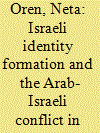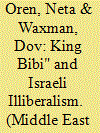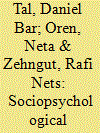|
|
|
Sort Order |
|
|
|
Items / Page
|
|
|
|
|
|
|
| Srl | Item |
| 1 |
ID:
094698


|
|
|
|
|
| Publication |
2010.
|
| Summary/Abstract |
This study focuses on the relationship between national identity and intractable conflict. Abdelal's definition of collective identity that refers to the level of agreement regarding the purposes, practices, relational comparisons with other entities, and narratives that define collective identity was adapted to national identity during intractable conflict and was later applied to Israel's national identity. A review of the Israeli 1969-2006 election platforms shows that in the 1980s and 1990s significant changes occurred in Israel's national identity. The most significant changes included: changes regarding the territorial purpose of Israeli identity; changes in practices on who may become an Israeli citizen; changes of perception of the relationship between Israel and the Arabs; and a growing Israeli acceptance of Palestinian identity. Since 2000, following the failure of the Israeli-Palestinian peace process, some components of Israeli national identity have reverted to their original form. The study indicates that the Arab-Israeli conflict triggered changes in Israel's national identity, but the conflict also seemed affected by changes in that identity. The article connects the changes in Israeli national identity to specific mechanisms and conditions of conflict resolution and reconciliation.
|
|
|
|
|
|
|
|
|
|
|
|
|
|
|
|
| 2 |
ID:
189053


|
|
|
|
|
| Summary/Abstract |
This article assesses democratic backsliding in Israel during Prime Minister Benjamin Netanyahu's years in office from 2009 to 2021, drawing comparisons to similar developments in Hungary and Turkey. While the democratic back-sliding that occurred in Israel during this period resembled what was taking place in these other countries, Netanyahu was less successful in achieving his goals than Viktor Orbán and Recep Tayyip Erdoğan, despite employing similar rhetoric and tactics. Netanyahu's lack of success is explained by the amount and nature of affective polarization in Israel, its parliamentary system of government, and its electoral system.
|
|
|
|
|
|
|
|
|
|
|
|
|
|
|
|
| 3 |
ID:
134157


|
|
|
|
|
| Publication |
2014.
|
| Summary/Abstract |
Societies involved in intractable conflicts form conflict-supporting narratives that illuminate and justify their intergroup conflicts. These narratives play an important role in satisfying the basic sociopsychological needs of the involved individuals and collectives. In order to fulfill this role the narratives tend to be biased in favor of the in-group, selective, distorting and simplistic. This article analyzes such narratives that focus on the following major themes: Justification and Threats (of conflict), Delegitimization (of the opponent), Glorification and Victimhood (of the in-group), the in-group's need for Patriotism and Unity, and its Aspiration for Peace. Additionally, the article describes the individual and collective functions of these narratives. It also describes six main methods that are used in the narratives' construction: reliance on supportive sources, marginalization of contradictory information, magnification of supportive themes, fabrication of supportive contents, omission of contradictory contents, and use of framing language. Because conflict-supporting narratives are so functional, the involved societies struggle to support their dominance within their own society as well as in the international community. This article, therefore, presents seven methods that are used by the parties in their intrasocietal struggles - control of access to information, censorship, discrediting of contradicting information, monitoring, punishment, encouragement and rewarding, and closure of archives. Similar methods are used in the international arena struggles. Finally, it describes the process of change from adherence to the conflict-supportive narratives to the construction of new peace-supporting narratives and Adherence to Them.
|
|
|
|
|
|
|
|
|
|
|
|
|
|
|
|
|
|
|
|
|